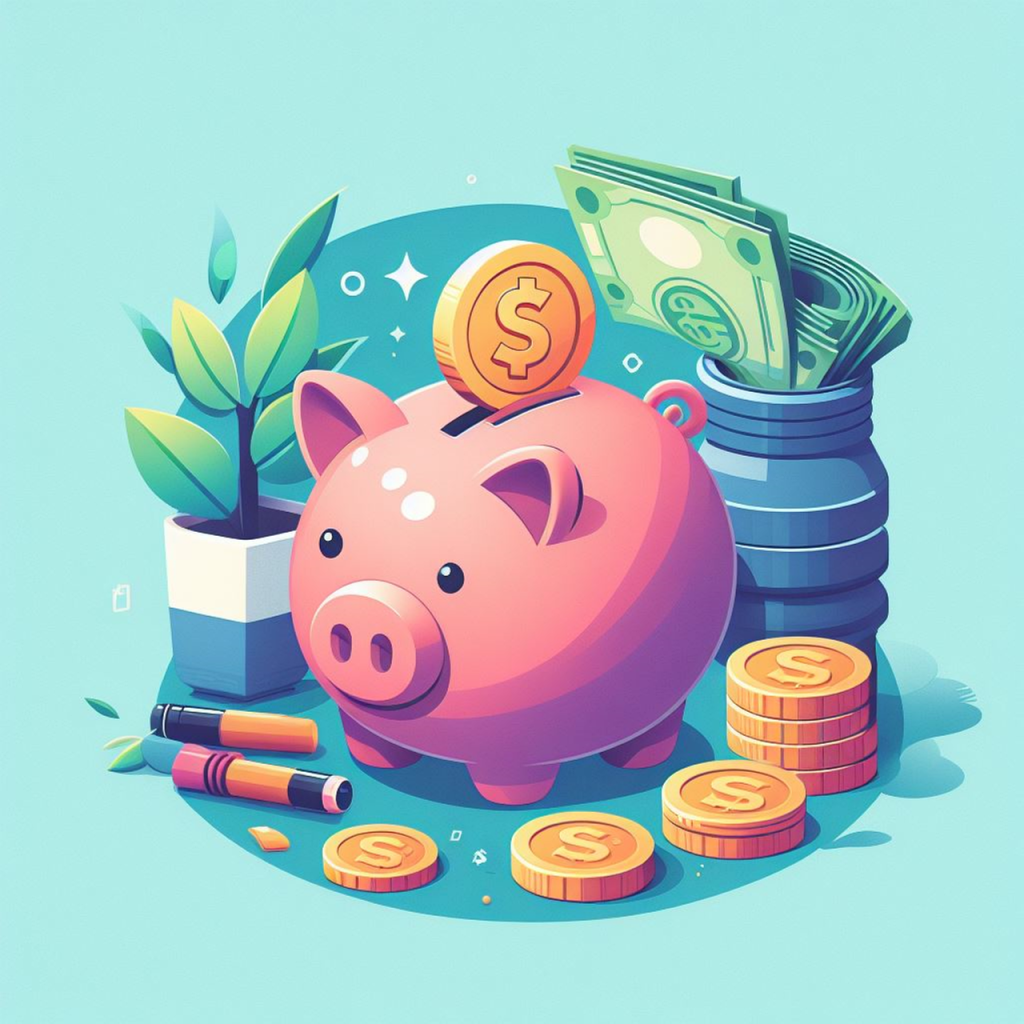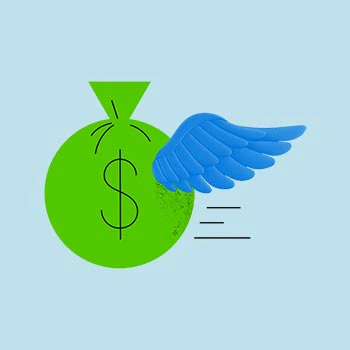Best money saving apps of 2025
Updated . Automate your savings, earn cashback, and build wealth with these top-rated money apps.
Automation advantage: The best money saving apps work in the background, automatically rounding up purchases, transferring spare change, or finding better deals. Set them up once and let technology boost your savings effortlessly.
Security standards: All recommended apps use bank-level encryption, are FDIC-insured (where applicable), and follow strict security protocols. Many are backed by established financial institutions for added protection.
Editorial Note: CreditVana receives compensation from certain third-party advertisers, but this doesn't influence our editors' opinions or reviews. Our partners don't review, approve or endorse our editorial content. Information about financial products not offered by CreditVana may be collected independently. We strive for accuracy at the time of publication.
Our top money saving app picks
How we picked: We compared ease of use, saving effectiveness, fees, security, user reviews, and unique features across different saving strategies.
Best overall: Acorns
Why it stands out: Seamlessly combines automated savings with beginner-friendly investing. Rounds up purchases to the nearest dollar and invests the spare change in diversified portfolios, making wealth building effortless.
- Round-up investing: Automatically invests spare change from everyday purchases.
- Diversified portfolios: Professional ETF portfolios based on your risk tolerance.
- Found Money: Earn cashback investments from partner retailers.
- Educational content: Learn about investing through articles and videos.
- Retirement accounts: IRA options for tax-advantaged saving.
- Fees: $3-12 monthly depending on plan, no trading fees.
Best for beginners: Qapital
Why it stands out: Simple round-up savings with goal-setting features and optional investing. Perfect for people new to automated saving who want to build emergency funds or save for specific goals.
- Round-up rules: Multiple ways to save including round-ups and percentage rules.
- Goal setting: Create specific savings goals with target dates and amounts.
- Smart features: Save based on spending patterns and habits.
- High-yield savings: Earn competitive interest on savings balances.
- Optional investing: Add investment portfolios when ready.
- Fees: $3-12 monthly, FDIC-insured savings accounts.
Best cashback: Rakuten
Why it stands out: Earn cashback at thousands of online retailers simply by shopping through their platform. Browser extension automatically applies coupons and tracks cashback earnings without changing shopping habits.
- Massive retailer network: Cashback at 3,500+ stores including Amazon, Target, Walmart.
- Browser extension: Automatically applies best coupons and tracks earnings.
- High cashback rates: Up to 10%+ cashback at many popular retailers.
- Sign-up bonuses: Often offers $10-25 bonuses for new users.
- Quarterly payments: Receive earnings via PayPal or check every quarter.
- No fees: Completely free to use with no hidden costs.
Best budgeting: YNAB (You Need A Budget)
Why it stands out: Powerful budgeting methodology that helps users allocate every dollar before spending. Focuses on breaking the paycheck-to-paycheck cycle and building financial awareness through proactive budgeting.
- Zero-based budgeting: Assign every dollar a job before spending it.
- Real-time syncing: Track spending across all devices instantly.
- Goal tracking: Built-in tools for debt payoff and savings goals.
- Educational approach: Teaches budgeting methodology, not just tracking.
- Bank syncing: Automatically imports transactions from accounts.
- Cost: $14.99/month or $109/year, 34-day free trial.
Best auto-saving: Digit
Why it stands out: Uses AI to analyze spending patterns and automatically save small amounts you won't miss. Sophisticated algorithms adjust saving amounts based on your cash flow and upcoming bills.
- Smart algorithms: AI analyzes spending to save optimal amounts automatically.
- Overdraft protection: No-overdraft guarantee protects your checking account.
- Goal-based saving: Create multiple savings goals with different priorities.
- Boost feature: Earn 1% annual savings reward on balances.
- Bill tracking: Monitors upcoming bills to avoid saving too much.
- Cost: $5/month, FDIC-insured savings accounts.
Best for goals: Yolt
Why it stands out: UK-based app (available in some US markets) with excellent goal visualization and progress tracking. Makes saving engaging through gamification and social features.
- Visual goal tracking: See progress toward multiple savings goals clearly.
- Round-up saving: Automatic spare change collection and allocation.
- Smart insights: AI-powered spending analysis and saving suggestions.
- Social features: Share goals and progress with friends and family.
- Integration: Connects with multiple bank accounts for full financial picture.
- Fees: Free basic version, premium features available.
Best rewards: Honey
Why it stands out: Browser extension that automatically finds and applies coupon codes at checkout, plus offers cashback through Honey Gold points. Saves money without requiring any extra effort from users.
- Automatic coupons: Finds and applies best promo codes at 30,000+ sites.
- Honey Gold: Earn points for purchases that convert to gift cards.
- Price tracking: Monitors items and alerts when prices drop.
- Mobile app: Find deals and earn rewards on mobile purchases too.
- Droplist: Track prices on items you want to buy later.
- No fees: Completely free browser extension and mobile app.
Best investment: Stash
Why it stands out: Combines micro-investing with financial education and banking services. Great for beginners who want to learn about investing while building wealth through small, regular investments.
- Fractional shares: Invest in expensive stocks with as little as $5.
- Themed investing: Choose from pre-built portfolios based on interests or values.
- Educational content: Learn about investing through articles and tutorials.
- Banking services: Debit card with round-up investing features.
- Retirement accounts: IRA options for tax-advantaged investing.
- Fees: $3-9 monthly plans, no trading commissions.
Money saving app features comparison
| App | Primary Feature | Monthly Cost | Best For |
|---|---|---|---|
| Acorns | Round-up investing | $3-12 | Beginner investors |
| Qapital | Round-up savings | $3-12 | Goal-based savers |
| Rakuten | Shopping cashback | Free | Online shoppers |
| YNAB | Proactive budgeting | $14.99 | Serious budgeters |
| Digit | AI-powered saving | $5 | Hands-off savers |
| Honey | Automatic coupons | Free | Deal hunters |
Potential savings example
Scenario: Using multiple apps together for maximum benefit
- Acorns round-ups: $30/month invested automatically
- Rakuten cashback: $15/month from regular shopping
- Honey coupon savings: $25/month from automatic discounts
- Digit auto-saving: $75/month saved intelligently
- Total monthly benefit: $145 in savings and investments
- Annual impact: $1,740+ in additional wealth building
Results vary based on spending habits and app usage patterns.
How we picked these money saving apps
We evaluated dozens of money saving apps based on effectiveness, ease of use, security standards, fee structures, user reviews, unique features, and overall value proposition for different saving and spending styles.
Types of money saving apps explained
Round-up savings apps
Automatically round purchases to the nearest dollar and save or invest the spare change. Great for effortless micro-saving without impacting your budget.
Cashback and rewards apps
Earn money back on purchases through retailer partnerships. No behavior change required—just shop through their platforms or use linked cards.
Budgeting and tracking apps
Help monitor spending, create budgets, and identify saving opportunities. Range from simple trackers to comprehensive financial management tools.
Automatic saving apps
Use AI to analyze spending patterns and automatically transfer small amounts to savings. Save money without thinking about it.
Investment apps
Make investing accessible through low minimums, fractional shares, and educational content. Turn savings into long-term wealth building.
Deal-finding apps
Automatically find coupons, compare prices, and alert you to deals. Save money by ensuring you never pay full price.
Tips for maximizing money saving apps
- Use multiple apps: Combine different types for maximum benefit (saving + cashback + investing).
- Start small: Begin with one app to build the habit, then add others gradually.
- Automate everything: Set up automatic features to remove the need for constant attention.
- Review regularly: Check app performance monthly and adjust settings as needed.
- Link to dedicated accounts: Use separate accounts for app-based saving to avoid confusion.
- Take advantage of bonuses: Many apps offer sign-up bonuses or periodic promotions.
Money saving app security and safety
What to look for
- Bank-level encryption: 256-bit SSL encryption for all data transmission.
- FDIC insurance: Savings accounts should be FDIC-insured up to $250,000.
- Read-only access: Apps should only read account data, not initiate transactions.
- Two-factor authentication: Additional security layer for account access.
- Established backing: Apps backed by legitimate financial institutions.
Red flags to avoid
- Apps requesting full banking credentials instead of using secure APIs.
- Unclear fee structures or hidden charges.
- No FDIC insurance for savings products.
- Poor user reviews regarding security or reliability.
- Apps that aren't transparent about how they make money.
Important considerations: While money saving apps can be powerful tools, they're not magic solutions. Success still requires some financial discipline, and fees can add up. Always read terms carefully and understand how each app makes money.
Choosing the right apps for you
For beginners
- Start with: One round-up savings app + one cashback app
- Focus on: Building the habit of saving and seeing progress
- Avoid: Too many apps at once—this can be overwhelming
For active savers
- Consider: Multiple apps for different goals and strategies
- Advanced features: Goal tracking, investment options, detailed analytics
- Fee tolerance: May justify higher fees for more sophisticated features
For deal hunters
- Priority: Cashback and coupon apps that maximize shopping savings
- Behavior: Apps that work automatically without changing habits
- Multiple platforms: Use several to ensure maximum coverage
Common money saving app mistakes
- Using too many apps: Can become overwhelming and counterproductive.
- Ignoring fees: Monthly fees can add up and offset savings benefits.
- Not linking properly: Failing to connect all relevant accounts limits effectiveness.
- Setting unrealistic goals: Overly aggressive saving targets that aren't sustainable.
- Forgetting to review: Not checking progress or adjusting settings over time.
- Relying solely on apps: Apps are tools—you still need basic financial discipline.
Questions about money saving apps
- Are money saving apps safe to use?
- Reputable apps use bank-level security and many are FDIC-insured. They typically use read-only access to your accounts, meaning they can see your data but can't move money without your permission. Always verify security features before signing up.
- How much money can I realistically save with these apps?
- Results vary widely based on spending habits and which apps you use. Round-up savings typically generate $20-100+ monthly, while cashback apps can save $10-50+ depending on shopping volume. The key is consistency over time.
- Do I need to pay for multiple saving apps?
- Not necessarily. Start with free apps like Rakuten and Honey, then add paid apps if you see value. Many people find that one paid saving app plus free cashback apps provide the best balance of cost and benefit.
- Can I use multiple saving apps together?
- Yes, and this is often recommended. Different apps serve different purposes—you might use Acorns for investing, Rakuten for cashback, and Digit for savings. Just monitor total fees and ensure each app provides value.
- What happens to my money if the app company goes out of business?
- If the app offers FDIC-insured accounts, your money is protected up to $250,000 even if the company fails. For investment apps, securities are typically held by established custodians with SIPC protection.
- How quickly will I see results from money saving apps?
- Cashback and coupon apps show immediate results. Round-up and automatic saving apps typically show meaningful results after 2-3 months of consistent use. Investment apps may take longer to show significant growth.
- Should I link my primary bank account to these apps?
- For round-up and saving apps, yes—they need to see your spending to work effectively. For security, consider setting up dedicated savings accounts for some apps rather than linking your primary checking account.
Important information: Money saving apps are tools that require active engagement to be effective. Results vary based on individual spending habits, app usage, and financial discipline. Always review terms and conditions, understand fee structures, and verify security measures before linking accounts. Past performance doesn't guarantee future results for investment-related apps.
Security reminder: Only use apps that employ bank-level security, offer FDIC insurance where applicable, and have strong user reviews. Never share full banking credentials—legitimate apps use secure, read-only connections to your accounts.
© 2025 CreditVana LLC. All rights reserved.









